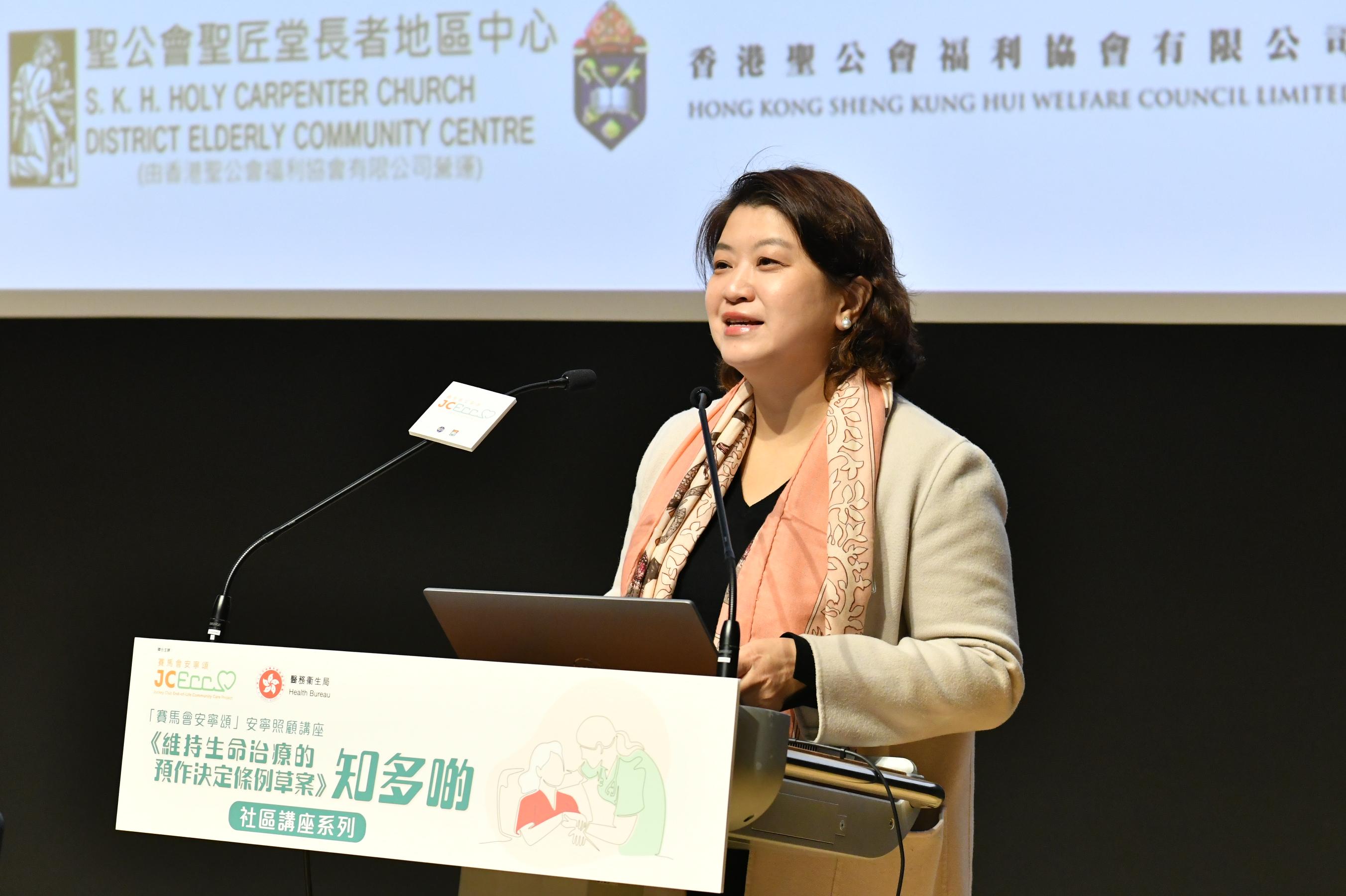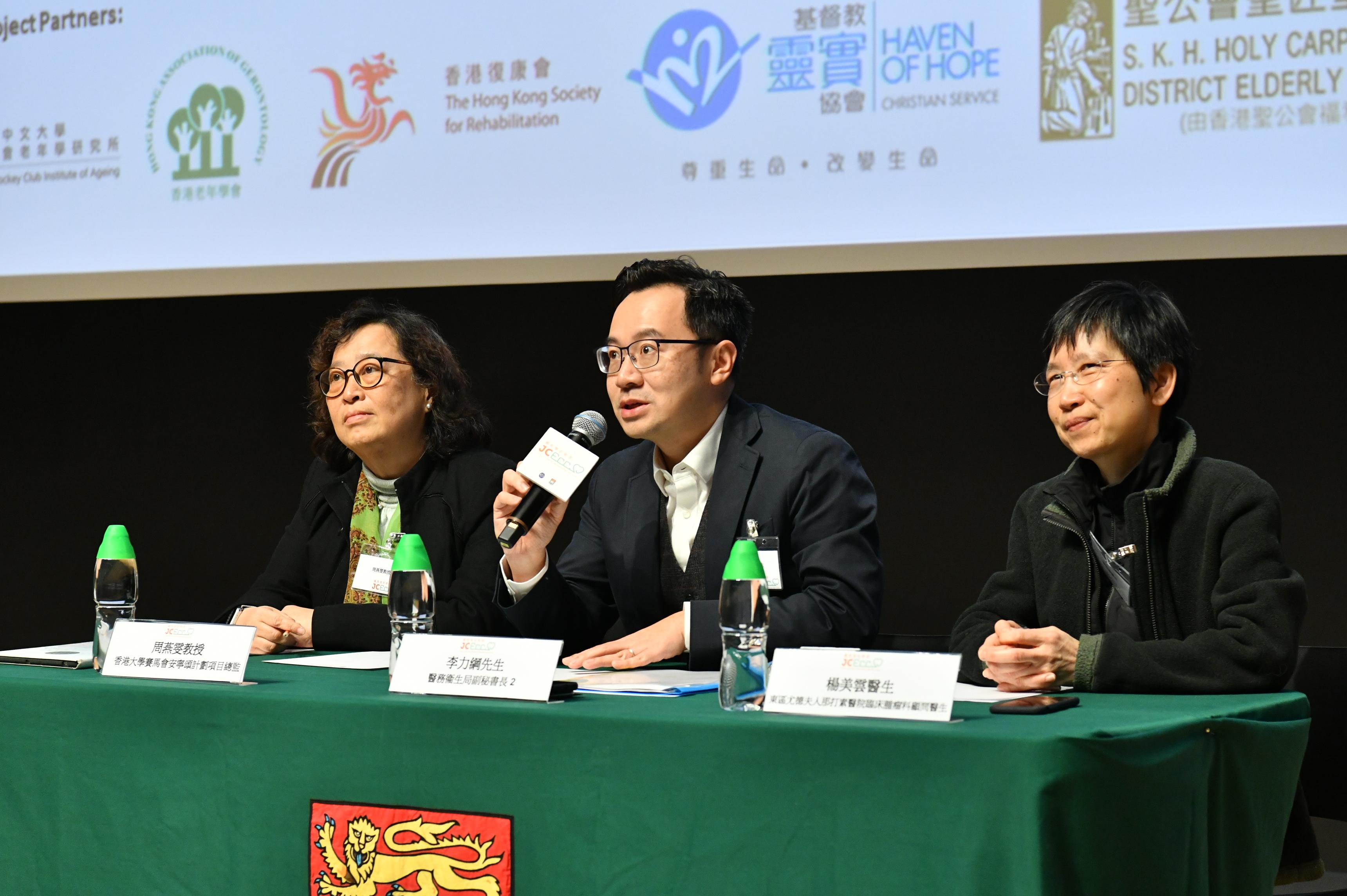US for Health reaches out to community to expound on legislative work relating to advance medical directives and dying in place (with photos)
The Under Secretary for Health, Dr Libby Lee, attended a community talk on the Advance Decision on Life-sustaining Treatment Bill co-organised by the Health Bureau and the Hong Kong Jockey Club Charities Trust today (January 27). She expounded to members of the public on the Government’s legislative work in relation to the advance medical directives (AMDs) and dying in place, and how the relevant policy initiatives can enhance patients’ quality of life during their final days.
She spelt out the advantages of making advance medical directives for patients at their final stage and their family by sharing her personal experience.
“Despite my identity as a healthcare professional who has used to witness births and deaths, it was totally a different issue when it came to my own family. I was fortunate enough to have had discussions with my mother on her preferred end-of-life care arrangement before she passed away. By that, I was able to spend quality time with her during her precious last moments and bid final farewell to her in the way she wished.
“However, death is unpredictable. During my days as a practising doctor, I encountered many occasions on which the patients were unable to discuss in time with their loved ones on their preferred medical arrangements for their final days, and to treasure the last opportunities to communicate with them. That left their living family with much regret. In this regard, the Government is working on establishing legal frameworks for aspects such as AMDs and do-not-attempt cardiopulmonary resuscitation (DNACPR) orders for the sake of honouring patients’ decisions and providing quality and holistic end-of-life care to the patients and their families.”
The Bill covers mainly two parts, namely the AMDs and the DNACPR orders. An AMD maker who is mentally capable of deciding on a life-sustaining treatment can specify that upon meeting the specified precondition of the instruction stated in the AMD, no life-sustaining treatment specified in the instructions can be performed to him or her when he or she is mentally incapable of deciding on a life-sustaining treatment. A DNACPR order is an instrument that directs not to perform cardiopulmonary resuscitation on a person suffering from cardiopulmonary arrest. The making of both AMDs and DNACPR orders will adhere to the principle of “cautious making, easy revoking”. At the time of making, an AMD requires the presence of no less than two witnesses who must satisfy certain conditions (including, to the best of his/her knowledge, not being a beneficiary of the maker’s estate, etc) with one of the witnesses being a registered medical practitioner (RMP) while the DHACPR order must be made by two RMPs (one of whom must be a specialist). In either case, the maker can revoke at any time by verbal/written means or destroying the AMD/DNACPR order as long as he or she is mentally capable to do so.
Furthermore, the Government suggests amending the relevant provisions in the Coroners Ordinance (Cap. 504) and the Births and Deaths Registration Ordinance (Cap. 174). Upon amendment, if a resident who passed away in a residential care home was diagnosed as having a terminal illness when he or she was alive and was attended to by an RMP within 14 days before passing away, and his or her certificate of cause of death states that he or she died of a natural cause, such a death case will no longer be considered as a reportable death to the Coroners Court.
Details can be found in a press release issued earlier.
The legiative proposal was submitted to the Legislative Council (LegCo) last December. The Health Bureau is in the process of scrutinising the provisions with the LegCo Bills Committee.
The Deputy Secretary for Health Mr Eddie Lee also attended the community talk today. He introduced to the audiences the background of the legislative work, the key provisions and relevant arrangements. Mr Lee stressed that the Government would continue to enhance the supporting measures, in particular the promotion of communication among the patients, their families and medical professionals on the advanced care plan for end-of-life care. He also answered questions from the floor together with the Consultant of the Clinical Oncology Department of the Pamela Youde Nethersole Eastern Hospital, Dr Rebecca Yeung, during the interactive session.
Today’s community talk is the first of the series, attracting some 140 members of the public. The remaining five community talks will be held at different locations across Hong Kong Island, Kowloon and the New Territories from February to April. The Government hopes to keep up with the explanatory work by reaching out to the community, thus enabling all in the society to get a better grasp of the legislative work relating to the Bill and dying in place, and promoting the end-of-life care and life and death education in the community.
Citizens who wish to join the community talks on the Advance Decision on Life-sustaining Treatment Bill may sign up via the website foss.hku.hk/jcecc/zh/adltb-2/ (webpage in Chinese only).




